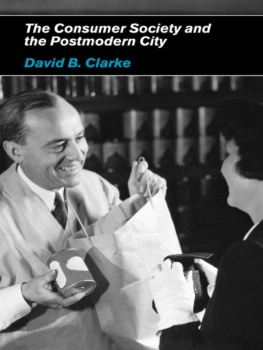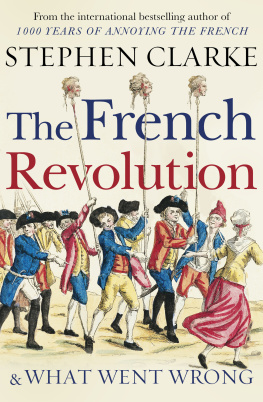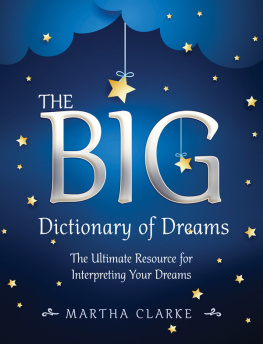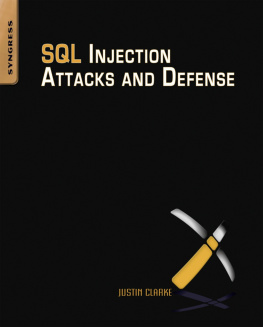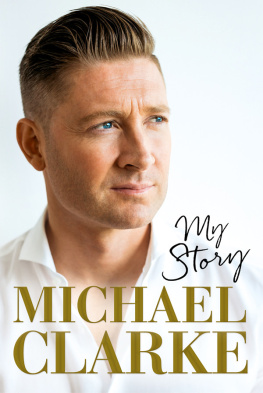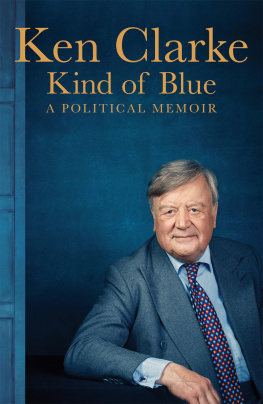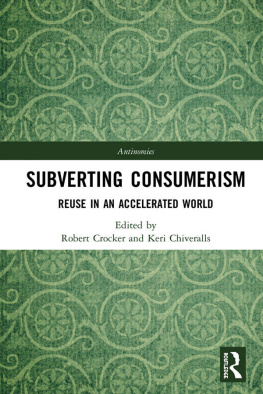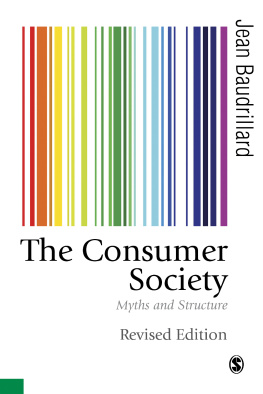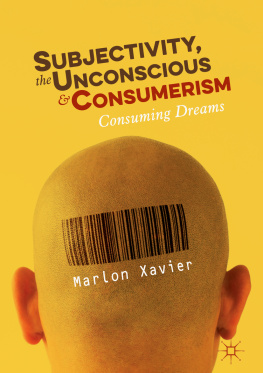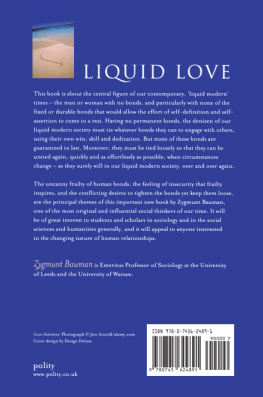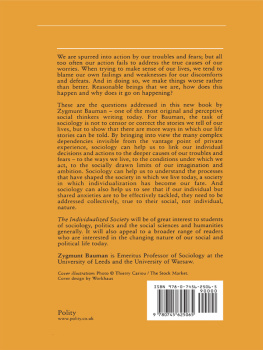The fact that we inhabit a consumer society has incredibly far-reaching implications. It affects the way we live our lives, the things we value, the direction society is taking. The city has always been a prime site of social change. The relationship between the city and the consumer society is the focus of this book.
Drawing on the work of the consumer societys most influential theorists, Jean Baudrillard and Zygmunt Bauman, the book examines the nature of consumption and its increasing centrality to the postmodern city by:
Working through the often controversial ideas of Baudrillard and Bauman, the book assesses the ways in which consumerism is reshaping the nature and meaning of the city. Employing a sustained and engaging theoretical analysis, the book ranges across a variety of sometimes unexpected topics. It represents an impassioned plea for everyone interested in the social life of cities to take the notion of the consumer society, and the arguments of its major theorists, seriously.
The Consumer Society and the Postmodern City
David B. Clarke

LONDON AND NEW YORK
First published 2003
by Routledge
11 New Fetter Lane, London EC4P 4EE
Simultaneously published in the USA and Canada
by Routledge
29 West 35th Street, New York, NY 10001
Routledge is an imprint of the Taylor & Francis Group
This edition published in the Taylor & Francis e-Library, 2004.
2003 David B. Clarke
All rights reserved. No part of this book may be reprinted or reproduced or utilized in any form or by any electronic, mechanical, or other means, now known or hereafter invented, including photocopying and recording, or in any information storage or retrieval system, without permission in writing from the publishers.
British Library Cataloguing in Publication Data
A catalogue record for this book is available from the British Library
Library of Congress Cataloging in Publication Data
A catalog record for this book has been requested
ISBN 0-203-41414-4 Master e-book ISBN
ISBN 0-203-41436-5 (Adobe eReader Format)
ISBN 041520514X (hbk)
ISBN 0415205158 (pbk)
Consumption becomes a larger element in the standard of living in the city than in the country.
(Veblen 1994, 55)
Just as industrial concentration results in an ever increased production of goods, so urban concentration results in a limitless promotion of needs.
(Baudrillard 1998a, 65)
Now will the city have to fill and swell with a multitude of callings which are not required by any natural want.
(Plato, The Republic 2, 373b [Jowett 1871])
Acknowledgements
I have accrued an enormous number of debts in bringing this work to completion. The most direct I owe to two individuals with whom I have had the privilege of working most closely: Mike Bradford, who first sparked (and for a while nurtured) my interest in consumption; and Marcus Doel, a long-term collaborator whose unique brand of poststructuralist geography has proved enormously beneficial to my own thought processes. I should also like to acknowledge a debt to the late Antony Easthope and to Rob Lapsley, whose extra-mural course at the University of Manchester, Under French eyes, provided an extraordinarily pleasurable initiation into the rigours of poststructuralist thought. The present text will undoubtedly reveal the enormity of my debt to Zygmunt Bauman, whom, on occasion, has offered invaluable words of encouragement. In thanking him, I can only hope that the use to which I have put his ideas might do justice, in some small measure, to his own remarkable body of work.
In a somewhat different context, I would like to thank two Heads of Department at Leeds, John Stillwell and Graham Clarke (no relation), both of whom have been supportive of my work; even though it is, I suspect, relatively inscrutable from their own ardently positivist perspective. My sincere thanks also to everyone at Routledge, past and present, for their assistance, support, and, above all, patience. Sarah Carty, Andrew Mould and Ann Michael deserve my gratitude. I should also like to acknowledge the support of an ESRC Fellowship (award no. H52427002294), without which the time and means to explore the topic of consumption would not have been forthcoming. More formally, I acknowledge permission to include the following work as chapters of the present book: a version of Chapter 2 previously appeared in the International Journal of Urban and Regional Research, 21(1), 218237. Thanks to Blackwell Publishers Ltd for permission to include this material, in amended form, here. Likewise, thanks to Carfax Publishers Ltd for permission to reprint the material comprising Chapter 3 from the review issue on Urban consumption of Urban Studies, 35(5 and 6), 865888, again in slightly amended form. I am once again grateful to Mike Bradford for his permission to include our jointly authored work as part of this book. Much of the material included here has been presented as seminars at a variety of institutions. Thanks to all those who offered valuable suggestions and posed challenging questions on such occasions. Thanks also to several generations of students taking my masters modules at Leeds, especially for turning up new references every time I thought I was on top of the literature. The staff of the Graphics Unit of the School of Geography, University of Leeds, and their counterparts at the University of Manchester, skilfully prepared Figures 1 and 4, and Figure 3, respectively. Thanks to all concerned for their efforts.
Last, but by no means least, I would like to thank a number of individuals who have read and offered comments on various parts of the manuscript, particularly Martin Purvis and Marcus Power. Thanks also to Jon Goss for providing perceptive comments on an earlier draft.
Introduction
Just over a fortnight after the 11 September 2001 terrorist attacks on the twin towers of New Yorks World Trade Center, the Pentagon in Washington DC, and the failed attack on the White House, the Daily Telegraph ran the frontpage headline: Britain needs you to shop . Tony Blair asked people to go shopping and take holidays to prevent the economy going into recession after the terrorist attacks in the United States, the article continued (Jones and Smith 2001, 1). The Prime Ministers exhortation might have appeared somewhat surreal if not, to some, downright distasteful but there could be no doubting its seriousness. The so-called War on Terror, declared in the wake of the al-Qaeda strikes, would have been fatally compromised had consumers failed to keep on consuming, thereby plunging the world economy into recession. James Arnold of the BBC went to great pains to explain the importance of consumer confidence, recording similar sentiments to the Telegraph with subheadings such as: Shopping: your patriotic duty (Arnold 2001). What is intriguing in all of this, however, is that there was no mention of the fact that precisely the opposite sentiment was promulgated throughout the Second World War. Dig for Victory, Savings Bonds, and a general ethos of tightening ones belt to get us through figured amongst the patriotic duties of the citizen of the free world at that time. Production, not consumption, was then the order of the day. What clearer indication could there be than the edict to Shop for Victory that

